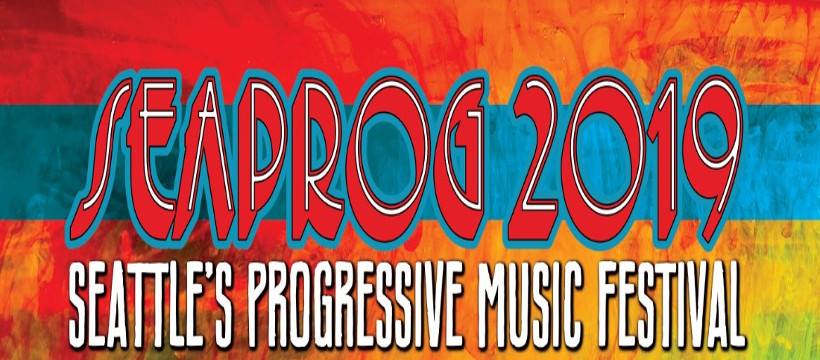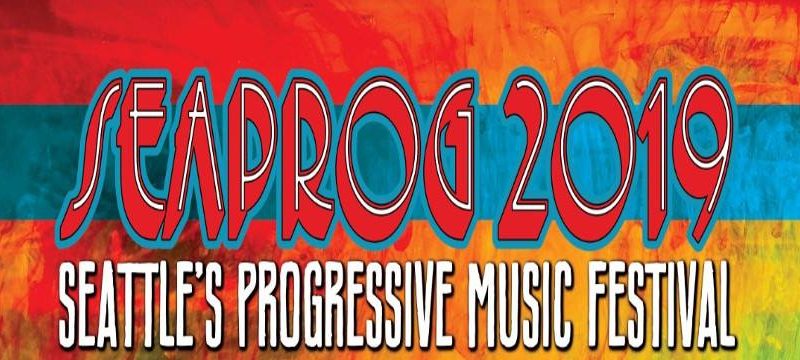Interview: NWMS chats with Dennis Rea of Seaprog

Seaprog, the northwest prog festival is back, now in its seventh year, coming to the Columbia City Theater June 7th through June 9th. Dennis Rea, one of the leading-light honchos but by no means the only one (see below), was kind enough to sort out some history, some philosophy, and this year’s crop.
NWMS: How did you start in on the idea of a prog fest?
Dennis Rea: Seaprog was initially an outgrowth of the periodic Zero-G Concert Series, which showcased adventurous creative musicians from the outer reaches of jazz, rock, and experimental music who had precious few performance outlets in Seattle.
Quite a few of the artists we presented were playing what I would term progressive rock – a very slippery definition to be sure – so it was proposed that we launch a dedicated annual progressive rock festival in Seattle to bring more attention to those artists. Others had attempted this in the past, mostly focused on visiting artists, but nothing had caught on until now.
The “Central Committee” at first comprised myself, John Reagan, and Jon Davis but has since grown to include six volunteer organizers with the addition of Joe Fischer, Dave McLelland, and Tom Prather, progressive rock scholars all. Each of us handles various duties – booking, fundraising, stage management, etc. – and each of us is an active musician.
NWMS: How did you go about setting up the first festival, and when was that?
Dennis Rea: From the beginning, Seaprog’s charter was to shine a light on the largely neglected Pacific Northwest progressive rock community and provide a more dignified setting commensurate with the seriousness of the music, rather than the dingy dive bars that progressive rock is typically relegated to in this area. While the emphasis remains on regional musicians, we always bring in a few national or international exemplars of the music to create more of a draw and expose local audiences to tremendous artists they’d be unlikely to see otherwise.
Since progressive rock has very limited appeal in the Seattle area, we were careful not to overreach and settled on what we feel is the ideal venue in terms of size and atmosphere, the historic Columbia City Theater. All six editions of Seaprog have taken place at CCT, and we’ve developed a wonderfully symbiotic relationship with the staff. The first Seaprog festival took place in 2013 and was successful enough to encourage us to continue on an annual basis. The festival has grown steadily ever since, though we have no ambition whatsoever to go ‘big time.’
Every festival necessarily reflects the tastes of its organizers, and in our case those tastes run decidedly to the more avant-garde end of the progressive continuum, though we strive to present a balance of progressive styles. We tend to shy away from so-called neo-prog and what I term “Dungeons and Dragons prog,” some of which has given prog in general an undeservedly bad name. There are several existing festivals that focus on more traditional “symphonic” eprog, but very few that showcase the more experimental side of things, so that’s where we choose to place our emphasis.
It’s also important to us that the festival is run by musicians, and on a nonprofit basis – we’re definitely not in it for the (negligible amount of) money. Last year (2018) we formed a partnership with our nonprofit sponsor Shunpike, which opened doors to various funding sources, and this year we’ve partnered with King County arts organization 4Culture, who’ve generously provided additional funding. After years of investing our own resources in Seaprog, we’ve turned a corner in the past two years and are now self-sustaining.
We’re also dedicated to overturning perceptions that prog is largely a bastion of white, male musicians and listeners. We’re very proud of the fact that Seaprog has significantly greater participation across gender and ethnic lines than any other progressive-rock festival we’re aware of.
NWMS: Is Seattle a decent city for prog? Which are your favorite bands from around here, and why?
Dennis Rea: That’s a loaded question… Overall, the Seattle area has traditionally been rather hostile to progressive rock, hence its relegation to the margins over the years. It’s reflexively dismissed using the same old worn-out, inaccurate epithets – elitist, pretentious, pompous, self-indulgent, and so on. We challenge those who slag what they think is progressive rock to attend a Seaprog show and have their expectations overturned – the music has come a long way from its origins in the 1960s and ‘70s and has evolved into a myriad of forms.
While progressive rock is mostly ignored by local audiences, the region boasts a wealth of top-flight progressive musicians whose work stands up to that of progressive artists anywhere – indeed, that’s why we started this festival in the first place. The city is home to a number of globally important progressive players such as Trey Gunn, Alan White, and Michael Shrieve and has become the rehearsal location of choice for what is arguably the greatest progressive band in history, King Crimson.
Less well known but equally deserving of attention are local bands like composer Tim Root’s astounding TROOT project, the all-star assemblage Moon Letters, the utterly enchanting Clearly Beloved, and dare I say it, my own band Moraine, which is far better known outside of Seattle. In general, Northwest progressive musicians seem to be less concerned with genre divisions and more inclusive in their musical influences (jazz, world music, electronic music) than similar communities elsewhere.
NWMS: Which bands are on the bill this year? Could you briefly describe each one and where each one comes from?
Dennis Rea: This year’s lineup is tilted a bit more toward out-of-town visitors than in years past, basically a consequence of who was available. We have three very strong headliners this year who aptly demonstrate the stylistic diversity of today’s progressive rock, and equally strong acts throughout the lineup.
We’re very honored to be presenting the legendary Swedish progressive band Trettioåriga Kriget in their first-ever U.S. West Coast appearance (Friday 6/7); the band has been active since 1970 and we find it most appropriate that they’re performing in our city with its strong Nordic roots.
Saturday’s headliner, Chicago’s Marbin (Saturday 6/8), falls more on the jazz-rock fusion side of the spectrum and has attracted a large national following with their incandescent live shows.
Of all of this year’s bands, District 97 (Sunday 6/9), also from Chicago, are probably closest to what most people would consider “prog,” with intricate arrangements and a knockout female vocalist.
The above-mentioned TROOT (Friday 6/7) is a collection of local, national, and international players performing the mind-blowing compositions of Tim Root, who’s steeped in classical and theater music. A subset of TROOT also performs as EchoTest (Sunday 6/9), led by the phenomenal bassist Julie Slick, also of Adrian Belew’s band.
The duo of Markus Reuter (Berlin) and ex-King Crimson member Trey Gunn (Seattle) (Saturday 6/8) represent a virtual summit meeting of advanced “touch guitar” (played by tapping and other techniques) players.
And representing the Northwest are Seattle’s Moon Letters, Dust Mice, and Yesod; Bellingham’s The Sheen; Fox Island’s Immensity Crumb; and from Arcata, California, Farmhouse Odyssey. Taken together, the lineup presents an exemplary cross-section of contemporary progressive rock with an adventurous bent, and will no doubt surprise listeners whose idea of progressive rock is more along the lines of the sometimes overblown arena-rock acts of the 70s. You won’t be hearing anything like ELP at this festival.
NWMS: What were the most difficult tasks of putting on the festival this year and what strategies did you use to work through them?
Dennis Rea: As with any volunteer effort, simply finding the time to do the considerable organizational work, alongside day jobs, lives, and multiple personal musical projects is the biggest challenge. Thankfully we have more hands on board now and have divided up the duties in a way that best suits each organizer’s talents.
Apart from that, the greatest challenge is overcoming the public’s entrenched notions of what “prog” is – the genre is so much more varied than most people realize, and the usual caricatures really don’t apply in Seaprog’s case.
NWMS: What’s in the future for Seaprog?
Dennis Rea: Having gained a solid footing over the past couple of years, and with a growing awareness of the festival worldwide, there’s every reason to believe that Seaprog will continue to present the finest local and visiting progressive musicians to the public for the foreseeable future. While there’s room for growth, we’re comfortable with the scale of the event and our mission to showcase lesser-known exemplars of the genre.
Check out the Seaprog website HERE for additional information about the 2019 festival.

